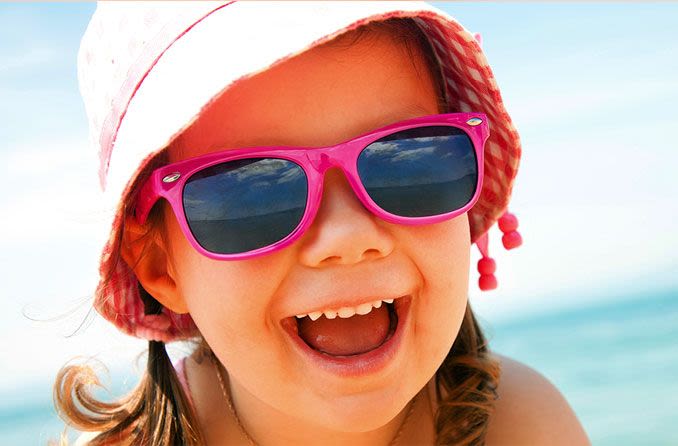Buying kid's sunglasses? Here's what to look for

Do children need sunglasses?
Yes, they absolutely do. Damage to eyes from exposure to the suns harmful ultraviolet (UV) radiation is cumulative over our lifetime.
As children spend much more time outdoors than most adults do, kids' sunglasses that block 100 percent UV are especially important.
Some experts estimate that up to half of a person's lifetime exposure to UV radiation occurs by age 18. If this is true, sunglasses may be more important for children than most people imagine.
Wearing sunglasses during childhood may play an important role in preventing eye problems later in life that have been associated with cumulative UV exposure, including cataracts and pterygia.

Sunglasses help protect children's eyes from UV rays and glare, whether it's a sunny day at the beach or a cloudy day on a snowy mountaintop. Make sure your child's sunglass lenses are made of a shatter-resistant material such as polycarbonate.
And UV rays aren't the only potential danger from sunlight.
Recently, researchers have suggested that long-term exposure to high-energy visible blue light from sunlight might increase the risk of macular degeneration later in life.
Children's eyes are more susceptible to UV and blue light than adult eyes because the lens inside a child's eye is less capable of filtering these high-energy rays. This is especially true for young children, so it's wise for kids to start wearing protective sunglasses outdoors as early in life as possible.
Also, be aware that your child's exposure to UV rays increases at high altitudes, in tropical locales and in highly reflective environments (such as in snow, on the water or on a sandy beach). Protective sunwear is especially important for kids in these situations.
Choosing the colour of sunglass lenses
The level of UV protection sunglasses provide has nothing to do with the colour of the lenses.
As long as your optometrist certifies that the lenses block 100 percent of the sun's UV rays, the choice of colour and tint density is a matter of personal preference.
Most sunglass lenses in ANZ are grey compared to Europe where brown or amber are more popular. Why the difference? Grey lenses will dull the bright sun but can make a dull day duller. Brown block a bit more blue light, enhancing contrast so they can make a dull day brighter.
Another great option is spectacles with photochromic lenses, which are clear indoors and darken automatically in sunlight.
Photochromic lenses are available in a variety of lens materials and colours and eliminate the need for a separate pair of sunglasses for children who need glasses for vision correction.
All photochromic lenses block 100 percent UV and filter ample amounts of high-energy visible blue light.
Where to buy kid's sunglasses
Children's sunglasses can be purchased from a variety of places, including your optometrists, online retailers and sunglass specialty stores.
Wherever you go, look for a good selection of sunglass frames scaled specifically for a child's face. Also, choose polycarbonate lenses for the best combination of lightweight comfort and impact resistance for added safety.
Finally, enquire about product warranties and satisfaction guarantees before you purchase sunglasses for children.
Don't forget the accessories
During the selection and fitting of your child's sunglasses, the optometrist should explain the benefits of the sunglasses and how to care for them.
Often, the optometrist will include or recommend cleaning cloths, solutions and a protective, hard-shell case to store the sunglasses in when they are not worn.
Sports cords also are a good idea. These can be attached to the temples of the sunglasses so that the do not get knocked off during activities and won't get lost or damaged.
READY TO SHOP FOR SUNNIES FOR YOUR CHILD? Find an optometrist near you.
Page published on Wednesday, 18 March 2020






